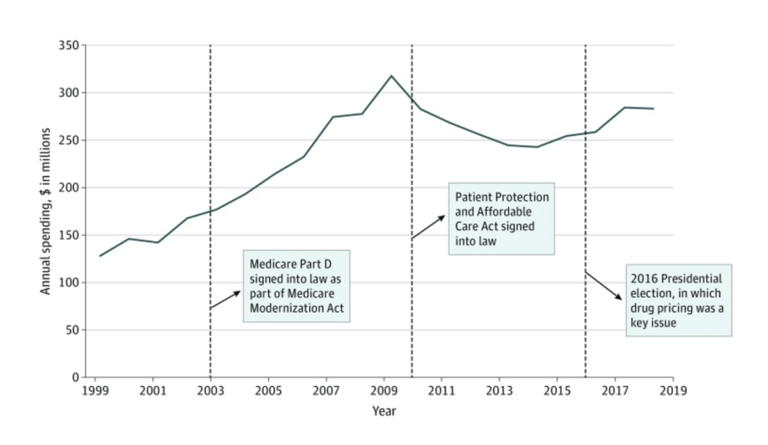Money Trails
High spending on lobbying and campaign contributions from the pharmaceutical and health product industry correlated with major health bills at the federal level.

Read Time: 2 minutes
Published:
In 2018, consumers spent $345 billion dollars on prescription drugs. Insulin alone can cost between $1,000-$2,000 a month. Drug prices continue as a pressing health care issue and most Americans favor government action to lower prices. Yet, persistent lobbying from major pharmaceutical players continues to slow drug-pricing reform.
Olivier Wouters analyzed lobbying and campaign contributions from the pharmaceutical and health product industry. Lobbying expenditures aim to support, change, or defeat legislation and ballot measures. From 1999 to 2018, the pharmaceutical and health product industry spent $9.7 billion dollars lobbying Congress and federal agencies; $367 million went to political candidates.
The study also found that the years with the highest spending correlated with major health bills such as the Affordable Care Act (ACA) and Medicare Part D, the federal insurance plan for prescription drugs. The pharmaceutical companies only agreed to support the ACA after ensuring that lower cost drugs from Canada would not be imported, Medicare would not be able to negotiate drug prices, and physician payments from Medicare would not be affected.
The graph above shows lobbying spending doubled in the 7 years after Medicare Part D was signed. Big spenders include manufacturers such as Pfizer and Johnson & Johnson. Out of all industry lobby organizations, 5 of the top 8 spenders were related to health care: Pharmaceutical Research and Manufacturers of America, American Medical Association, American Hospital Association, Blue Cross Blue Shield, and AARP.
Lobby and campaign contributions affect state politics as well. From 1999 to 2018, the pharmaceutical and health product industry spent $877 million on state candidates and committees; almost half was spent in California. Most of the money was spent in states with ballot measures relating to pharmaceuticals. Three cost-regulatory drug measures were defeated in California and one in Ohio due to this extraordinary spending.
When 1 in 4 Americans say it is difficult for them to afford their prescriptions, maybe we should rethink the influence corporate money has on life-saving policies.
Databyte via Olivier J. Wouters. Lobbying Expenditures and Campaign Contributions by the Pharmaceutical and Health Product Industry in the United States, 1999-2018. JAMA Intern Med. 2020 May. 180(5) 1-10.



